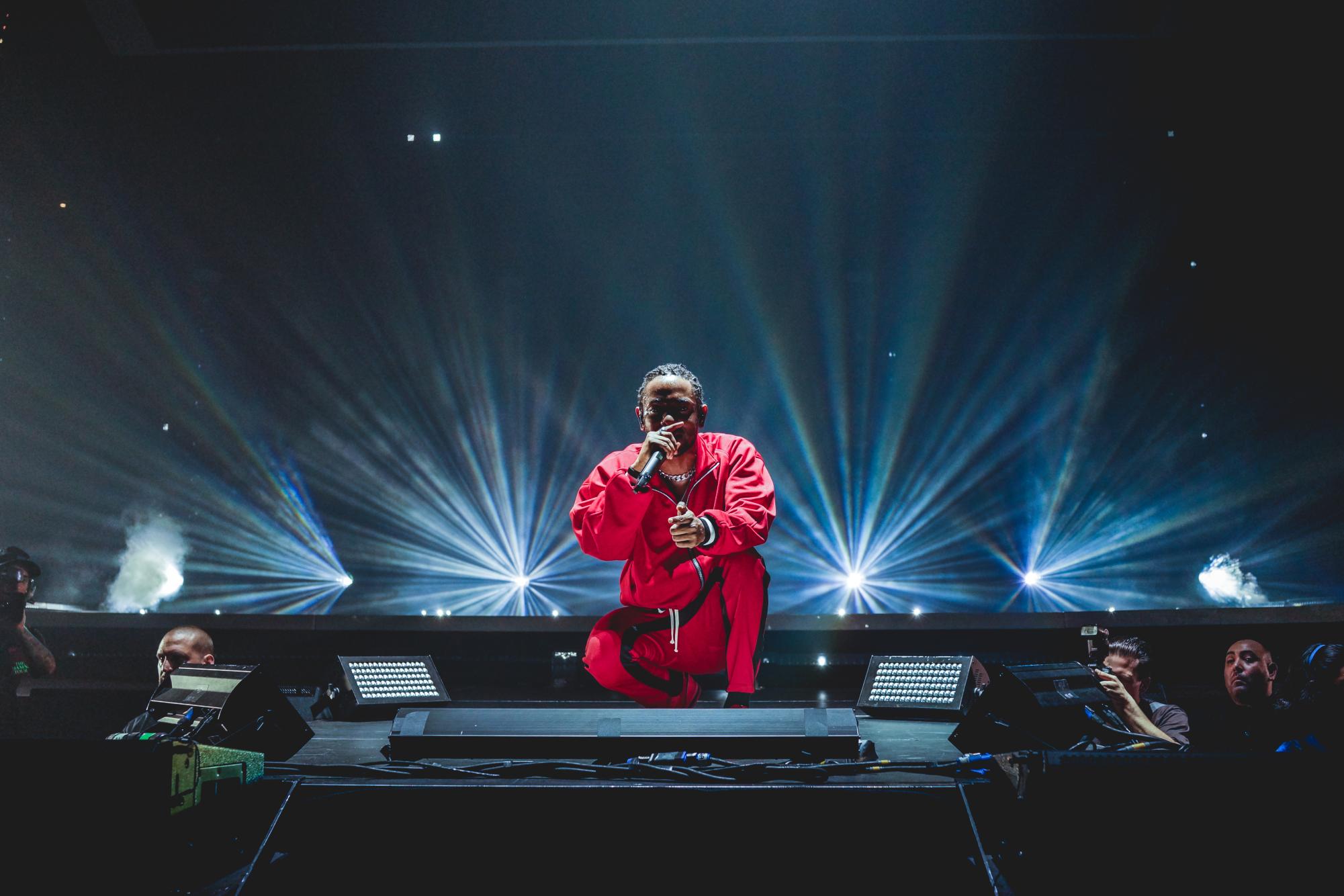Taking on the music industry’s biggest stage on Feb. 9, Pulitzer prize-winning artist Kendrick Lamar did more than just give a Super Bowl halftime performance; he portrayed a cultural movement and a homage to rap, African American and United States history.
The performance began with actor Samuel L. Jackson, introducing himself as Uncle Sam clad in a respective outfit and top hat, portraying the role of a dictator in Lamar’s “Great American Game.” He then introduced Lamar who is on top of a Buick GNX car, in reference to the title of his latest album, “GNX.” In a comedic clown car fashion, an entourage of dancers emerged from the car dressed in red, white and blue as Lamar told the audience, “The revolution is about to be televised, You picked the right time but the wrong guy” before kicking off into his first song on the setlist, “Squabble Up.” This statement, which was an allusion to Gil Scott-Heron’s 1971 poem, perfectly set the tone of Lamar’s message to the audience with this performance: that not only does societal change happen in a public fashion, but it also must occur despite how society commonly ignores the voices that advocate for positive change and instead gives a platform to the wrong voices. Following the performance of “Squabble Up,” Jackson transitions, describing Lamar’s performance as “too loud, too reckless, too ghetto.” This introduction is a masterful representation of how mainstream American society perceives Black expression, culture and art, and a perfect prelude to the rest of the halftime show.
Now, the show had officially begun, with the rapper performing his hit song “Humble” alongside his dancers as their choreography forms the American flag. Lamar stood in the center of the flag, creating a barrier that prevented the flag from being completed. The symbolism was clear: the current divide Americans face amid an era of polarized political beliefs. He carries this theme into his demeanor during the next songs, “DNA” and “Euphoria,” before performing his song “Man at the Garden.” Lamar stood alongside a group of men in front of a street light, to which Jackson responded with “Oh, I see you brought your homeboys with you, the old culture cheat code. Scorekeeper, deduct one life.” Beyond being evocative of video game imagery, this response represents Lamar’s roots and community, the oppression African Americans have faced in history and how the government often silences and dismisses Black creativity and art.
Lamar performed his song “Peekaboo” before assembling with four women for a hint at his infamous song “Not Like Us,” in which he says, “I wanna perform their favorite song, but you know they love to sue,” referencing his rapper-rival Drake. The women ask in unison, “What song?” before a snippet of the song plays. However, he does not play the song and instead carries on to his song “Luther” with official guest SZA, who also joined him for the song “All the Stars.” This section of the performance was otherworldly; the way Lamar and SZA worked in unison to form their perfectly curated style of sound blew me away. Lamar’s smooth raps mixed with SZA’s beautiful vocals made for a perfect song that stood out in a performance chock-full of memorable moments. Jackson then appeared to transition once again, saying “That’s what America wants — nice, calm” and once again calling back to Lamar’s themes of how America prefers to understate African American culture.
This was followed by the highlight and arguably the biggest moment of the show: interrupting Jackson’s respite, the opening chords to “Not Like Us” began playing. As the four women alongside Lamar asked, “You really about to do it?” he responded with, “Forty acres and a mule this is bigger than the music,” and, “You tried to rig the game but you can’t fake influence,” exhibiting absolute genius through these lines. “Forty acres and a mule” is a direct reference to unfulfilled promises of reparations made to formerly enslaved African Americans after the Civil War. By referencing this, and saying “This is bigger than the music,” he emphasizes that his success goes beyond his artistry, but instead is part of a larger struggle for Black empowerment and recognition throughout history. “You tried to rig the game but you can’t fake influence” is a direct shot at those who try to manipulate or control success within the music industry, driving home Lamar’s message one last time that at the end of the day, talent can’t be faked and must be authentic.
Finally, the energy in the stadium peaked as Lamar performed “Not Like Us.” As he moved across the field, Lamar looked directly into the camera with a wide grin as he rapped the line, “Say, Drake / I hear you like ‘em young,” almost as if he were directly addressing his rival. By the time he got to the song’s most iconic lyric, “Tryna strike a cord and it’s probably A minor,” the entire crowd had joined in; just when the audience thought Lamar’s diss couldn’t get any more brutal, Drake’s ex-girlfriend Serena Williams suddenly appeared as part of the choreography on a lamp post. For the final song of the night, Lamar brought out producer Mustard, who has worked on multiple tracks with Lamar, including “Not Like Us” and the song being performed, “tv off.”
Overall, the show was breathtaking. The only way the performance fell short was that Lamar did not perform enough of his classics like “Money Trees” or “Alright.” But otherwise, it was a moment of incredible significance not only for Lamar but also for Black American culture. Every component of this performance had a deeper message beyond what meets the eye, serving as an excellent reflection of the everyday struggles Black people experience. Lamar did not simply deliver a halftime performance: he delivered a deeply resonant story.



